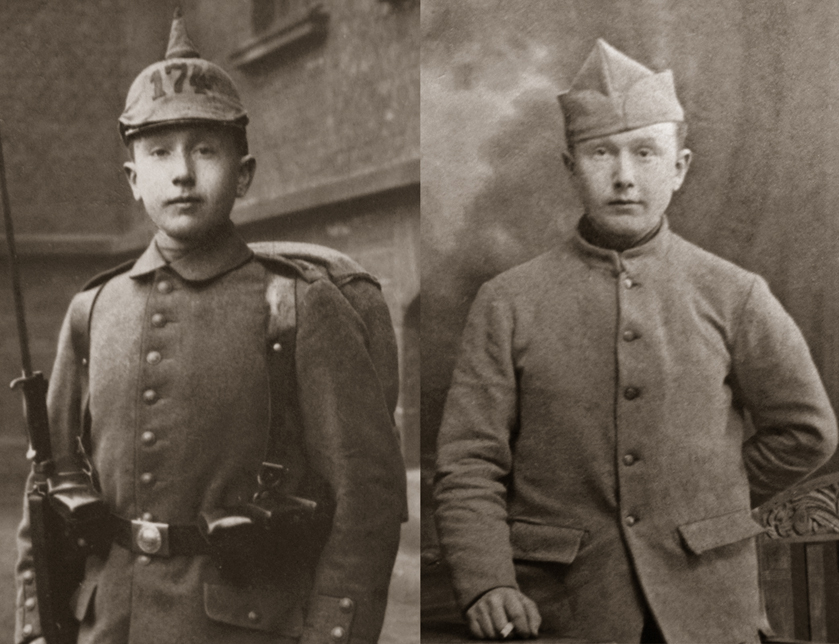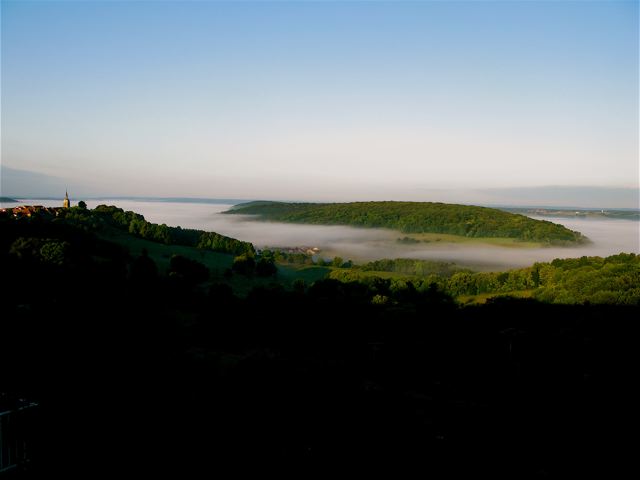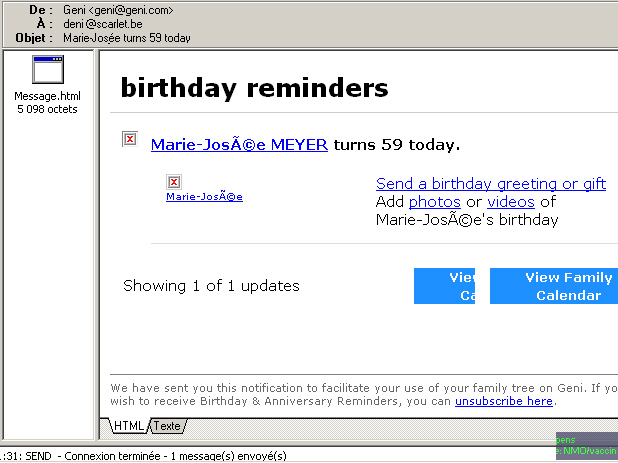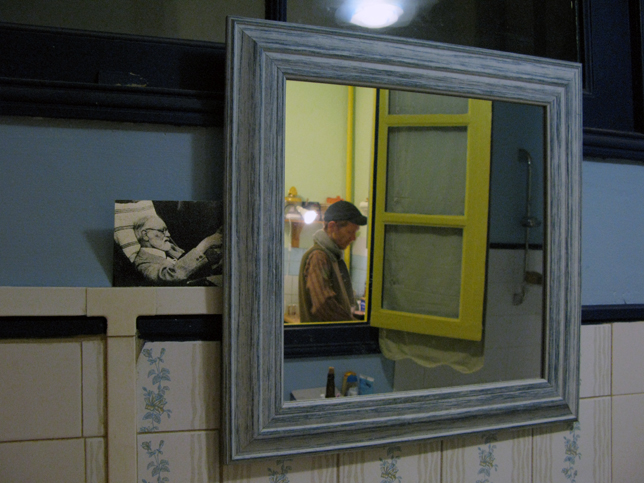Casque à pointe et calot : identité nationale
Posté dans divers, MOTS, REGARDER par kerbacho - Date : janvier 24th, 2010Mon grand-père maternel Nicolas, en hommage auquel j’avais ouvert ce bloc-notes en juin 2005, est mort il y a 29 ans, le 24 janvier 1981, âgé alors de 85 ans.
Le temps passé depuis ce jour inoubliable est celui de la vie d’un jeune homme mûr, et pourtant j’ai l’impression que c’était avant-hier. Peut-être parce que je me tenais près de lui à l’instant de sa mort, sans toutefois comprendre vraiment ce qui se passait. Qui comprend « ce qui se passe » quand quelqu’un meurt ?

Sur aucune de ces deux photos de Nicolas prises à un ou deux ans d’intervalle, il n’a encore cet âge ! Et pourtant il a déjà porté deux uniformes différents, l’allemand avec le casque à pointe, à gauche, endossé à la fin de la guerre de 1914-18 (la Lorraine était allemande depuis 1870), et sous lequel il ira jusqu’en Roumanie, et le français, avec le calot, à droite, après 1918 (dates exactes à définir).
C’est entre autres dans la juxtaposition de ces deux photos que je puise mon refus fondamental des identités nationales et surtout mon aversion pour les uniformes (quel que soit le drap dans lequel ils sont taillés, réels ou virtuels) qui caricaturent ce que les nations peuvent avoir de bénéfique.
Coiffy-le-Haut
Posté dans divers, REGARDER par kerbacho - Date : janvier 4th, 2010
Vue de Coiffy-le-Haut au lever du jour (photo 2009 | Jocelyne L.-D.)
T M Krishna’s recent concert at Oosterport, Groningen, Netherlands
Posté dans CARNATIC, divers, ÉCOUTER par kerbacho - Date : janvier 3rd, 2010Un mélomane indien, apparemment médecin, venu au concert avec ses collègues médecins réunis pour un congrès à Groningen, parle de son expérience de spectateur du concert donné en mars 2009 par le chanteur T. M. Krishna dans la salle Oosterpoort où ont lieu à Groningue les concerts de la tournée de concerts indiens organisée plusieurs fois par an par le Tropen Theater d’Amsterdam.
Le texte intégral peut être lu ici.
«
What is important when one presents carnatic music to a western carnatically uneducated audience? To baffle them with chaste carnatic complexity or to mellow the audience and elucidate the greatness through its manodharma? [...].
TMK’s presentation [...] deserves much admiration and ovation. TMK elaborated mainly, Karaharapriya and Thodi in its chaste glory and mathematical intricacy, how one would if they are being presented perhaps at the Madras Music Academy. The suprasensory perception of the beautiful was evident in both pieces and at some point, I was indeed in meditation. However to the vast carnatically unerudite audience, as I realised from the feedbacks I received, it was a mere spectacle of sound and rhythm. While I really appreciated the essence of the bhava of our music TMK wished to portray, I felt he could have drawn the audience a little bit closer to the soul of our music had he, at least presented one item that drew some parallels between carnatic and western classical music at the very end of the concert. [...]
Though many of them enjoyed the concert, their enjoyment was instrumented by what a Hungarian cellist described to me as ‘fireworks’. The audience, small in number and many of them present upon my personal invitation were at loss with exactly what was happening on stage. I am a stout defender of classicm of our art. However sometimes when we tread new ground or when we have to popularise our art to an audience of different ethos, then we have to integrate our art with theirs and draw their mind to a level of erudite sensory perception. [...]
Upon request from a slovakian violinist and a musically untrained Neurologist who were sitting beside me, who wanted to know how the same raga or melody (because they couldnt really digest the heavyness of Karaharapriya and Todi) if treated in a slightly western style would resonate, I requested TMK to render the Madurai Mani Iyer english notes as a concluding item.
English Note par Madurai Mani Iyer
This simple item would have given the audience a perception of not only the extrapolation of the vocal, but also how the Mrudangam and the Violin would adapt, what exactly raga & swara mean etc. Such an exercise is not actually diluting our art, but explaining our art to a baroque audience. But TMK bluntly and aversely refused. [...]
Nevertheless I am not sure how the audience is in other parts of Holland. But carnatic vocal music, in particular, is a hard act to follow for untrained audience here in Groningen. They may applaud on witnessing something different to the usual or being exposed to a myriad of sound and rhythm, but if the aim is more to propagate an understanding of the manodharma of our music, then there is more to be presented than chaste music. Perhaps as a suggestion it might be worthwhile to conduct a simple lecture demonstration before foraying into Todi and Bhairavi and at least contain one item which draws parallels between our Todi/Bharaivi in Haydn or Chopin, purely to explain the very Todi and Bhairavi, at least the next time in Groningen!
[...]
Dr. Hari Subramanian
h.h.subramanian[at]med[dot]umcg[dot]nl
»
Prince Rama Varma sings a short interesting alaap in the Western Major Scale followed by the English Note popularized by Shri Madurai Mani Iyer
Autant je partage les interrogations de ce spectateur, autant je doute de l’intérêt de la solution qu’il propose. Je n’ai pas assisté à ce concert de T. M. Krishna, mais je comprends (et j’approuve) qu’il n’ait pas accédé à cette demande.
Seprimeren
Posté dans divers, MOTS par kerbacho - Date : janvier 2nd, 2010La communication entre les humains ne cesse de m’enchanter par ses inventions spontanées et pleines de bon sens. Il y a quelques semaines, l’un des ouvriers avec lesquels nous parlions en néerlandais de nos travaux, a utilisé à plusieurs reprises un verbe inconnu de moi, seprimeren, mais dont j’ai pu deviner le sens grâce au contexte. Il était question de supprimer notre fosse septique. J’en ai déduit que seprimeren signifait supprimer, mais quand j’ai voulu vérifier dans le dictionnaire, je me suis rendu compte que le mot ne s’y trouvait pas.

J’ai vérifié avant la publication de ce billet si Google le connaissait. Apparemment il lui était inconnu aussi. Pourtant je suis sûr qu’ici dans le Limbourg belge tout le monde comprend ce mot du jargon du bâtiment.
Dans quelques jours, si quelqu’un cherche ce mot, Google le conduira vers cette page. Désormais le mot existe aussi sous une forme écrite.
2010 commence bien.
Stay hungry, stay foolish
Posté dans divers par kerbacho - Date : janvier 1st, 2010Un programme comme un autre pour la nouvelle année !


